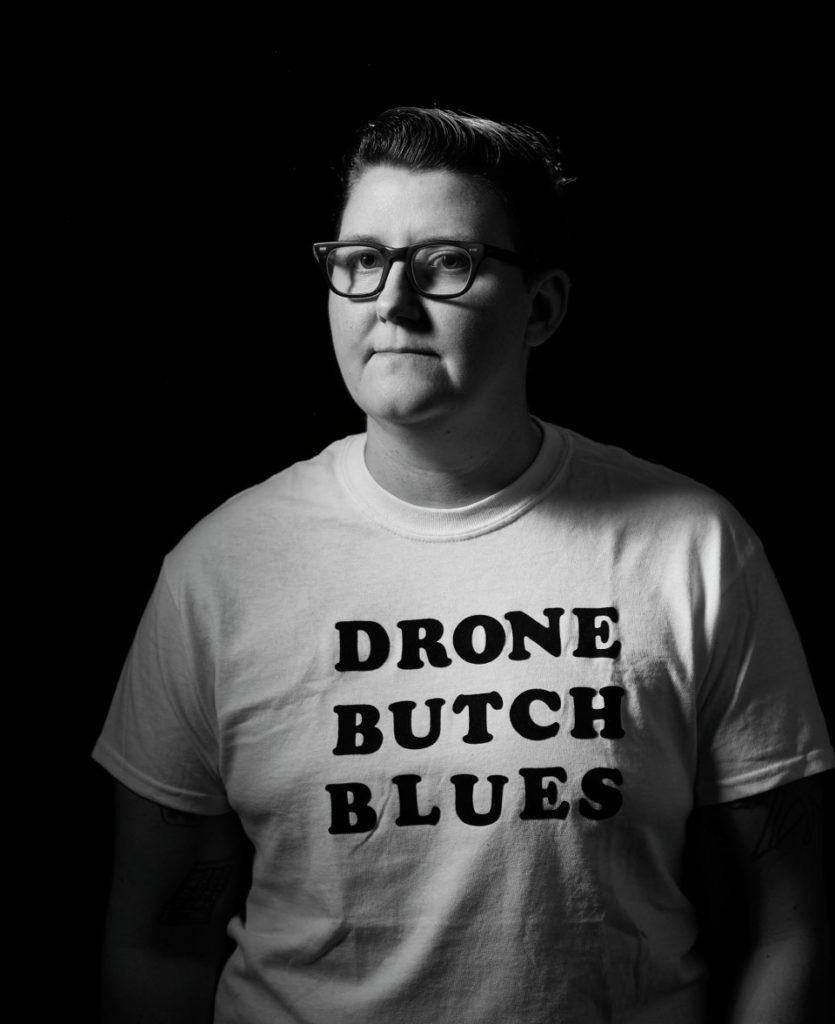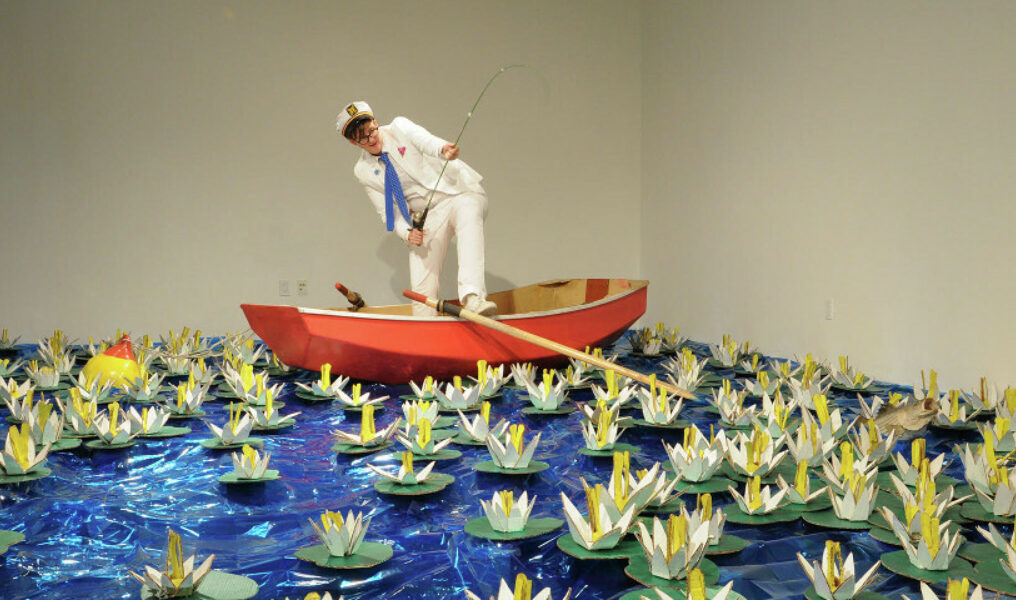As a multi-faceted, medium-diverse artist, it's likely that many fans of Clyde Petersen's work might know him from a specific project — like "Boating With Clyde," a digital interview series that happens on the waters of the Puget Sound — and not realize that his body of work spans from stop motion animation and installation artwork to music and live action filmography. The prolific, openly queer and transgender creator is Seattle-based, and just as comfortable creating a fully scaled cardboard Ford Econoline as he is behind the mic at a Your Heart Breaks concert — the band he's toured and played with for two decades this year. However, among his many projects, it's perhaps "Torrey Pines," an internationally known autobiographical stop motion animated film about life with a mentally ill mother for which Petersen is most famous.
It's in that film that Petersen was able to, among other things, widely share a story about a queer protagonist, a narrative that he notes is often lacking in mainstream storytelling. On Thursday, Feb. 21, Petersen will talk about that narrative and more with Southeast Michiganders when he arrives to deliver an artist lecture at The University of Michigan's Penny Stamps Speaker Series. BTL caught up with Petersen before his talk to get a feel for his thoughts on accessibility in storytelling, LGBTQ representation and upcoming projects.
Your talk is titled Alternate Realities, Intentional Histories and Queer Survival: Building Your own World in Dystopic Times. Could you elaborate on how that relates to LGBTQ storytelling?
I think it's related to all of the different kinds of art that I work on. It's definitely really story time for sure in the ways of preservation of history and being a queer person and telling your own story. I build a lot of installation work these days — giant cardboard rooms full of things — so, I've been having a lot more art shows like that, so it's more related to that but it's kind of all-encompassing. I have a show right now [called "Merch and Destroy"] at the Bellevue Arts Museum [in Washington] that's a larger-than-life touring van for a rock 'n' roll band and it's in the process of unloading. There's also a fake green room. I've been building those kinds of things for a while, the last 10 years, and thinking about what it means to recreate spaces and to kind of change who tells the stories of those spaces. I'm definitely going to be showing a lot of my work and animation and short films and "Boating With Clyde" and the installations.

That Bellevue exhibit is made entirely of cardboard, and your film, "Torrey Pines," is paper cutouts. What drew you to that medium?
Cardboard and paper are just so accessible and strong. That was the first instinct with them. There's a scene in "Torrey Pines" where I'm pulling cardboard boxes out of the dumpster to build a fort and that's very autobiographical. I love boxes and I've loved building forts since I was a little kid, so it's always been a material that I really enjoy. And, now that I'm an adult, I can buy giant 4-by-8 sheets to work with (laughs). You can buy like a pallet of 4-by-8 sheets of cardboard and build giant crazy things and it's really joyful. It's a lot more lightweight than wood and it clearly doesn't last as long, but in the right environment it can last for years.
Did you always want to be a visual artist?
I always wanted to be a filmmaker, so I studied documentary filmmaking in college and then right after college I was in a band, the same band I'm in now. After college I was just like, 'I want to go on tour and I want to film stuff and I want to play music,' so I just did that for a really long time, like 10 years. I just got in a van and toured with a lot of bands and artists and saw the world, and then grew up in a kind of punk DIY scene that way. And then I, a bunch of years into it, thought, "I want to get back into film." I have the skill set, so I moved back to Seattle and I started working in a post-production house making commercials and I hated it so much (laughs). So I got into animation and started making music videos. After I made 40 or 50 I wanted to make a feature, so I made "Torrey Pines."
This might sound silly, but what is a Torrey Pine?
No worries (Laughs). It's two things. It's a town in California where the film takes place — it's a very small town. The most famous thing in that town is a very famous rich person's golf course, but the town is named after a very specific kind of pine tree that only grows in two places in the whole world and Torrey Pines is one of them and a very small island somewhere else. It's a kind of pine tree that's very small but grows giant pine cones. Enormous. Comical for the size of the tree.
(Laughs) I appreciate you clearing that up! I've heard you're working on two new films now, too. What are they and will they match the artistic style of "Torrey Pines"?
My new film that I'm working on that is related to the "Torrey Pines" style of stop motion animation is called "Our Forbidden Country," and it's a stop-motion animated film about gay cruising pre-AIDS. It takes place in Seattle, Washington, in 1979. And so that is a similar style. It'll look different, but similar in the way it's animated. The other film I'm working on is a documentary of a band called Earth that is a live action shot-on-film documentary so that'll be more of a different situation.
When can fans expect those to come out?
"Our Forbidden Country" is in storyboarding right now — I'm snowed in in Seattle and have been doing storyboarding for a few days. It's pretty fun and we're building sets and stuff for it, but it's probably going to be about three years out. And then, this other film, the documentary I'm making is called "Even Hell has Its Heroes." That movie is probably about a year out.
"Torrey Pines" also didn't include any dialogue, just sound effects and a soundtrack. Will your new projects follow along the same lines?
I think primarily, yeah, but there will probably be some speaking in it but not very much. It's nice to create these films that can go around the world without subtitles. It's one of my favorite parts about it, taking it to Japan or anywhere and not having this language barrier.
Do you find that international audiences are able to connect with it more without subtitles?
Yeah, but you have to think about how it's going to translate culturally, but that's a different situation. But, you know, when I made "Torrey Pines" I was studying American Sign Language so that was a big part of it, just thinking about visual communication and how animation is such a good platform for that. And so I carried that idea into my animated works.
Has that lack of dialogue been a challenge at times?
It really depends. The choice to not use dialogue, it creates challenges and it opens up opportunities. It's both for sure. I'll find myself in a situation where I have to translate some really complex idea into visual language and, you know, it'll be a real head scratcher for a minute like, "How are we going to do this?" But we usually figure it out.
I will say, I really related to the scene in "Torrey Pines" where you have to shave your legs for the first time without knowing what to do. So dry!
Yeah, absolutely (laughs)!
Does Your Heart Breaks have any projects happening now?
I have a new record out and we just released the first music video for it this week and I'm touring it in April and May and my record is called "Drone Butch Blues" like "Stone Butch Blues" – a famous queer/gay book from an author named Leslie Feinberg. But basically, I spent the last three years reading works by queer authors and writing a musical record about it and one of the tracks, like the first track on the record is called "Our Forbidden Country."
Fans will see that it's very self-referential, like the fact that "Torrey Pines" was first a song you wrote.
Yeah. So, it's kind of like a "Torrey Pines" situation again where I wrote this record, did all this research about queer history before AIDS and then was like, "I want to make a film about it." Now the film has a theme song (laughs) and the record comes with a reading list that is like 24 books that you should read. It's all connected.










